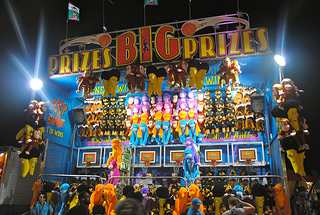In Praise of Big Prizes
An honors course of 150 students at the University of Texas requires short written assignments each week. The instructor had given prizes of $,1500, $1,000 and $500 to the top three papers at semester’s end. He abandoned this prize structure and now gives prizes of $100 to the three best papers each week.
The instructor, an English professor, is unfamiliar with tournament models and the idea that larger top prizes and a steeper prize gradient will elicit more effort than a flatter gradient, one with more prizes of smaller amounts (Lazear and Rosen, 1981). My guess is that he wants to be fair rather than confer such unequal prizes; but he would get better written work if he went back to the old system, just as Tiger Woods is better motivated by a big winning prize for a whole tournament than he would be by small prizes for having the best score in a particular round. Alternatively, combine equity and efficiency by offering two $100 prizes each week, then one $1,000 prize at the semester’s end.
(HT: L.C.)


Comments